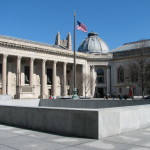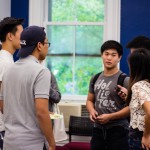by Alejandra Padín-Dujon
Framed by a portrait of Yale graduate Yung Wing, the first Chinese student to graduate from an American university in 1854, Timothy Dwight Master Mary Lui outlined the institutional barriers to promoting Asian American Studies. Perhaps the most significant is the mechanics of the hiring process.
Yale’s social scientists, whose departments hold much of the power to recruit Asian American Studies faculty “see themselves as theorists,” she said.
This approach clashes with the “integrated approach between theory and application” that Lui identifies as the hallmark of ethnic studies and its greatest asset. The spirit of the night—the hope for change—captivated students and faculty as they strategized to boost Asian American Studies at Yale.
On the night of October 19, the center hosted an Asian American Studies meet-and-greet featuring Yale’s four Asian American Studies professors: Master Mary Lui of Timothy Dwight College, historian and professor of “Asian American History, 1800 to the Present”; newly hired Assistant Professor of English Sunny Xiang; visiting novelist Susan Choi ’90; and Ethnicity, Race, and Migration lecturer Quan Tran.
Hosted by Asian American Studies Coordinators Catherine Tarleton ’16 and Hayun Cho ’17, the event comes as part of a renewed campaign to draw attention to Yale’s failure to establish an Asian American Studies program or even provide the minimum of two Asian American Studies courses per year—as it promised students in 1987.
In 2014, concerned students revived the Asian American Studies Task Force (AASTF), a student activist collective originally founded in the 1970s. That year, Yale provided only one Asian American Studies course for the entire 2014-15 academic year: Master Lui’s “Asian American History.” This past spring, the AACC and the task force held the 2015 Yale Asian American Studies Conference, attended by over 100 students.
In addition to concerns over the scarcity of American Studies courses, many worry that the combined burdens of teaching, research, and occupying innumerable leadership positions place unsustainable pressure on Yale’s tiny cohort of ethnic studies professors, threatening the future of Asian American Studies here at Yale (as well as ethnic studies more broadly) rather than affirming it.
“If I wasn’t master of TD college, I’d be teaching an upper-level Asian-American history course,” Lui said.
Even after the hiring of Sunny Xiang, the English department’s first Asian American Studies specialist, in the fall of this year, substantial concerns remain. Xiang will teach “Asian American Literature” in the spring, but the junior seminar will have limited enrollment and priority will go to English majors first and foremost—not to students of ethnic studies.
“I’d like to teach a bigger class, but honestly, I’m still getting the lay of the land,” said Xiang, echoing a similar comment made by Susan Choi minutes earlier to an eager graduate student. “I don’t know who or how to even ask for that.”
Since Asian American Studies has no department, and ER&M faculty have their primary posts elsewhere, Lui noted that “we can recommend, we can push—but at the end of the day, it’s not our decision.” The TD master expressed some optimism about representation of ethnic studies in the humanities.
As for allegations that budget cuts have undermined the Ethnicity, Race, and Migration department? They’re largely myth, Lui said. “ER&M is fairly healthy.”
Even so, financial constraints will prevent the department from tapping any post-docs and graduate students to teach Asian American Studies courses as they have in the past.
Despite the discouraging reality, student activists at the AACC work tirelessly to address what they see as fundamental defects in the system. Among the attendees of Monday night’s meet-and-greet was task force member Alexander Zhang ’18. He recently challenged the administration to commit to “a permanent expansion of Asian American Studies at Yale and to publicize a timeline of actions it will take to achieve this goal” in the Yale Daily News.
Amidst ongoing conversations about the renaming of Calhoun College and faculty diversity, Yale’s activists are not giving up the fight. According to Catherine Tarleton, the next big move may be to integrate the voices of La Casa, the Native American Cultural Center, the House, and the Asian American Cultural Center to address the plight of ethnic studies.
For anyone interested in the work of the Asian American Studies Task Force, they maintain a mailing list that is open to the public. Email crystal.kong@yale.edu to be added.


